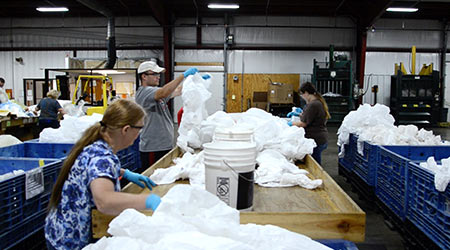
A West Virginia nonprofit organization is making a difference in the lives of people with disabilities while benefitting the environment at the same time. The Jackson County Developmental Center (JCDC) of Millwood has embarked on a partnership with RightCycle by Kimberly-Clark Professional to provide employment for people who have survived traumatic brain injuries or have been diagnosed with autism spectrum disorders, learning disabilities and other conditions.
The JCDC employees remove zippers and other metal parts from protective garments so that the apparel can be recycled through the RightCycle Program, the first large-scale recycling program for non-hazardous lab, cleanroom and industrial waste.
“Oftentimes people with disabilities are treated as if they can’t work,” said Sara Rose, development and communications specialist for JCDC. “The RightCycle Program provides them with a job and a very clear task. It’s adaptable for lots of different ability levels – whether it’s removing a snap or zipper or processing the whole garment.”
The RightCycle Program diverts previously hard-to- recycle items, such as single-use garments and gloves, from the waste stream and turns them into plastic pellets. These are then used to create consumer products and durable goods such as shelving, totes, and lawn and garden furniture. Since its launch in 2011, the program has diverted more than 450 tons of waste from landfills.
“The RightCycle Program is all about making a difference – diverting used garments and gloves from the waste stream and giving them a second life,” said Lisa Morden, senior director of global sustainability for Kimberly-Clark. “Working with JCDC enables us to extend the social impact of the program by helping to provide employment opportunities that help to improve people’s lives.”
The RightCycle Program also dovetails with JCDC’s commitment to the environment and to developing “green” lines of business.
“One of our goals is to eliminate waste in landfills and reduce, reuse and recycle,” said Mark Crockett, JCDC production manager. “This is a perfect example of going that extra step and getting a high volume of apparel and other items that had been previously landfilled and finding a way to recycle them. Generally, when you think of recycling, you think of wood pallets, plastic and glass, you don’t really think of cleanroom suits as being recyclable. This is a step in the right direction that, hopefully, will expand to a point where it becomes commonplace to recycle them.”
For JCDC employees, the program benefits extend beyond the financial.
“They grow by leaps and bounds because of the quality of life gained from employment,” Rose said. “The work also provides a sense of community and belonging.”
For some, the experience has been truly life-changing. One current employee arrived at JCDC from another agency with a blunt assessment: “He can’t really do anything.”
“He’s been named employee of the year three times,” Crockett said. “He works hard here. He bales. He counts. He weighs the bales. It just shows that with some patience, understanding and a willingness to let people show you what they can do, they can do anything.”
It’s a ripple effect that is felt well beyond the JCDC production floor. JCDC works to educate the community about the importance of inclusion and giving everyone a chance to participate in work and social activities. Families know that their loved ones are in a safe environment during the day. And employees without disabilities form friendships with people they might not otherwise get to know.
“From the young woman working side-by- side with people with significant disabilities to the older gentleman who had previously been institutionalized and unable to contribute to society, the RightCycle Program adds value to a wide variety of lives,” Rose said. “People with disabilities are not defined by their disability. They’re defined by the same things the rest of us are. When you think about the big picture, we all want to have purpose. And I can’t think of a better purpose than giving someone the opportunity to find theirs.”

 The Down and Dirty on Cleaning in Virus Season
The Down and Dirty on Cleaning in Virus Season How Surfactant Use is Expanding in Commercial Cleaning
How Surfactant Use is Expanding in Commercial Cleaning Clean Buildings Conference
Clean Buildings Conference